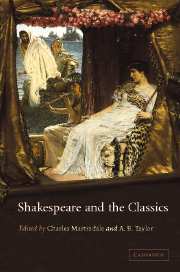Book contents
- Frontmatter
- Contents
- Notes on contributors
- List of abbreviations
- Introduction
- PART I AN INITIAL PERSPECTIVE
- PART II ‘SMALL LATINE’
- 2 Petruchio is ‘Kated’: The Taming of the Shrew and Ovid
- 3 Ovid's myths and the unsmooth course of love in A Midsummer Night's Dream
- 4 Shakespeare's learned heroines in Ovid's schoolroom
- 5 Shakespeare and Virgil
- 6 Shakespeare's reception of Plautus reconsidered
- 7 Shakespeare, Plautus, and the discovery of New Comic space
- 8 ‘Confusion now hath made his masterpiece’: Senecan resonances in Macbeth
- 9 ‘These are the only men’: Seneca and monopoly in Hamlet 2.2
- PART III ‘LESSE GREEK’
- PART IV THE RECEPTION OF SHAKESPEARE'S CLASSICISM
- Select bibliography (compiled by Joanna Paul)
- Index
7 - Shakespeare, Plautus, and the discovery of New Comic space
Published online by Cambridge University Press: 22 September 2009
- Frontmatter
- Contents
- Notes on contributors
- List of abbreviations
- Introduction
- PART I AN INITIAL PERSPECTIVE
- PART II ‘SMALL LATINE’
- 2 Petruchio is ‘Kated’: The Taming of the Shrew and Ovid
- 3 Ovid's myths and the unsmooth course of love in A Midsummer Night's Dream
- 4 Shakespeare's learned heroines in Ovid's schoolroom
- 5 Shakespeare and Virgil
- 6 Shakespeare's reception of Plautus reconsidered
- 7 Shakespeare, Plautus, and the discovery of New Comic space
- 8 ‘Confusion now hath made his masterpiece’: Senecan resonances in Macbeth
- 9 ‘These are the only men’: Seneca and monopoly in Hamlet 2.2
- PART III ‘LESSE GREEK’
- PART IV THE RECEPTION OF SHAKESPEARE'S CLASSICISM
- Select bibliography (compiled by Joanna Paul)
- Index
Summary
At Melania, every time you enter the square, you find yourself caught in a dialogue: the braggart soldier and the parasite coming from a door meet the young wastrel and the prostitute; or else the miserly father from the threshold utters his final warnings to the amorous daughter and is interrupted by the foolish servant who is taking a note to the procuress. You return to Melania after years and you find the same dialogue still going on; in the meanwhile the parasite has died, and so have the procuress and the miserly father; but the braggart soldier, the amorous daughter, the foolish servant have taken their places, being replaced in their turn by the hypocrite, the confidante, the astrologer.
haec urbs Epidamnus est, dum haec agitur fabula;
quando alia agetur, aliud fiet oppidum.
sicut familiae quoque solent mutarier:
modo hic habitat leno, modo adulescens, modo senex,
pauper, mendicus, rex, parasitus, hariolus.
(72–6; vol. II, p. 370)(This city is Epidamnus, during the presentation of this play; when another play is presented it will become another town. It is quite like the way in which families, too, are wont to change their homes: now a pimp lives here, now a young gentleman, now an old one, now a poor man, a beggar, a king, a parasite, a seer.)
- Type
- Chapter
- Information
- Shakespeare and the Classics , pp. 122 - 138Publisher: Cambridge University PressPrint publication year: 2004

